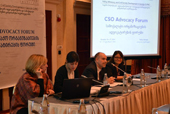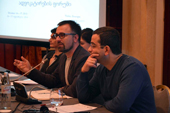
CSO Advocacy Forum took place in Tbilisi
By Messenger Staff
Tuesday, October 21
On October 16-17 civil society experts from the United Kingdom, the United States, Kosovo, Albania, and Georgia gathered to exchange ideas and share best practices at a forum on civil society advocacy in Tbilisi. The conference was organized by the East-West Management Institute (EWMI) in the framework of the Policy, Advocacy, and Civil Society Development in Georgia (G-PAC) project with co-organization by Civil Development Agency (CiDA).
Marc Lassman, Project Director considers that one of the best successes of the GPAC project is the appearance of a number of regional organizations and their activities within the project, which enables to reach more success in advocacy field in the regions of Georgia.
“Trying to raise the level of advocacy in the country was the main goal of the GPAC project,” Lassman stated… our idea was to try to gather international activists, activists who work on national issues in Georgia and activists who work on regional issues in Georgia to talk about the advocacy campaign, advocacy tools, what works, what does not work, what kind of international practices can be adopted in Georgia. Our hope is that the level of advocacy within the country becomes more effective, more evidence based and more creative,” Lasman added.
The forum provided a platform for Georgian NGOs and international experts to exchange ideas, share best practices in conducting advocacy campaigns, and strengthen their local and international networks. Panel topics at the forum included: successful strategies in international advocacy campaigns, successful advocacy examples in Georgia, mobilizing citizen support, raising alternative funding sources, engaging the media, and working with the government.
“I am very happy to be here and I am really attracted by the presentations and discussions presented today. I have presented the mechanisms and advocacy tools we use during our campaigns. My organization works on women’s issue and our goal is to empower women and girls in Kosovo in all fields, no matter to which ethnic or religion group they belong. I hope that my experience will help my Georgian friends carry out different campaigns in the country,” Igo Rogava, Executive Director of the Kosovo Women’s Network said.
Regional NGOs presented some successful examples of advocacy that have been carried out in their regions through the project. Shota Gaprindashvili, from Chiatura, introduced how the Union of Chiaturians protected public health and the environment. Industrial activities in Chiatura threatened the local environment and public health. Gaprindashvili and his NGO, with the support of EWMI G-PAC, began a campaign to prevent locals from expecting threats. They mobilized the community through petition drives and public events, identified the solution and engaged local government to ensure greater accountability. The outcome was pretty successful as the government and companies repaired local roads and ecosystems damaged by mining activities, built a 3 km bypass road to reduce hazardous materials transport through Chiatura, cleaned water reservoirs and installed a water pollution prevention system.
The other successful advocacy example is about eco migrants who have suffered due to natural disasters in the mountainous regions of Georgia and neglect from the government. NGO Borjgali based in Adjara tried to resolve their problem as a result of close cooperation with the government. They allocated funding for eco-migrant housing and included Borjgali’s plan for assisting eco – migrants in the regional disaster management strategy. In addition, the Ministry of IDPs started accepting applications for assistance from eco migrants. The Eco-migrant Center was created which provides job training for eco migrants.
Besides the successful campaigns, the discussion touched upon the image of NGOs currently in Georgia, what people think about them and whether they trust their activities.
Executive Director of CiDA Zviad Devdariani stated that the tendency is positive recently, which was shown in recent surveys about the trust of NGOs.
“We learn how to relate to people to whom we offer services within out projects. In past years, if we were sitting in the offices and writing projects and then we introduced it to our potential beneficiaries, people seemed confused and passive. They did not realize well enough why they should have gotten involved. Now we go with them, ask what they need and then carry out a project according to their requests. We should realize very well what we call them… are they only “clients” whom we offer some service or are they people who work with us and frame the outcome together? It is obvious that peoples’ trust towards us [the NGO sector] is in direct relation to their involvement,” Devdariani stated at the forum.
G-PAC is funded by the U.S. Agency for International Development (USAID) and implemented by EWMI.


